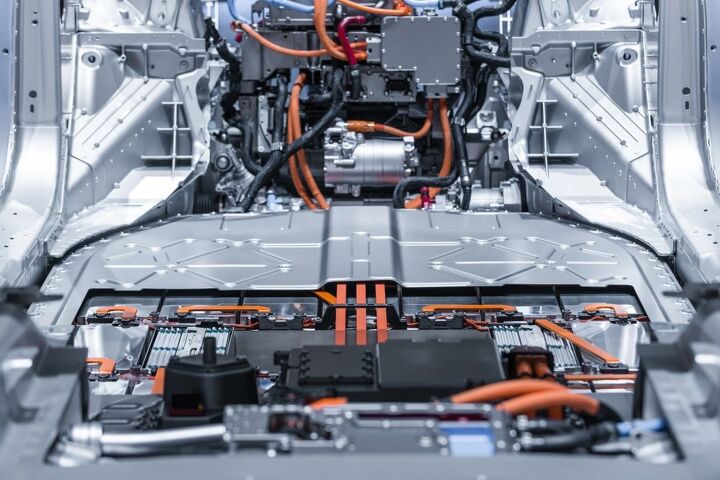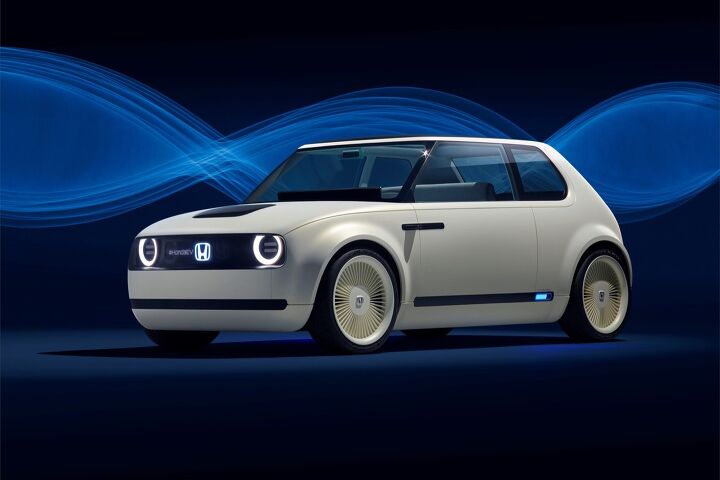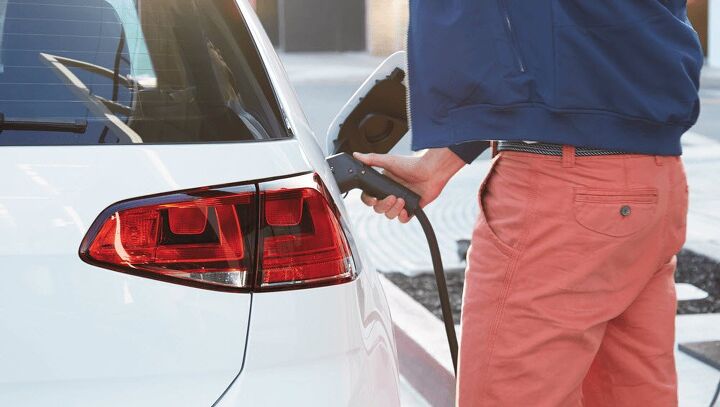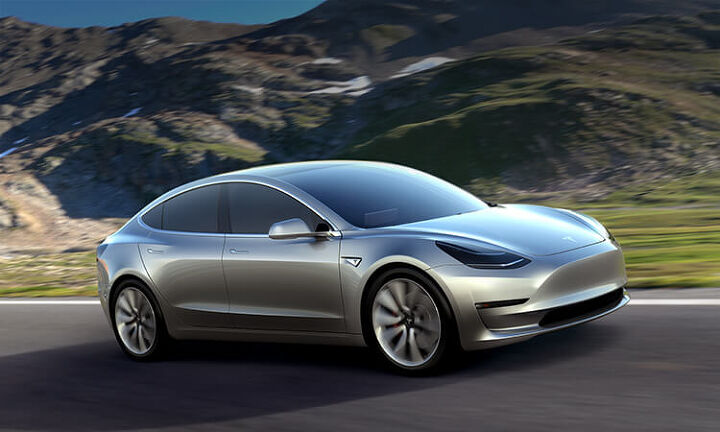#batteries
Disrupting the Industry: Korean Battery Suppliers at Each Other's Throats
While the automotive industry continues cleaning itself up via electrification and moral corporate messaging, most aspects of doing business have remained decently dirty. For all this striving for a utopian society, businesses still don’t like losing money and will go to great lengths to screw over the competition.
South Korean battery suppliers SK Innovation and LG Chem are currently clawing at each other like a couple of mad tigers. SK managed to secure a contract to supply Volkswagen Group with EV batteries, leading to the construction of a $1.7 billion factory in Georgia. LG did not, leading to a lawsuit. Both automakers and analysts are worried the litigation is spinning out of control, and could effectively obliterate their ability to do business in the United States.
A Stake in Tesla? Forget It, Says Volkswagen Boss
Volkswagen CEO Herbert Diess shot down rumors of a potential investment in electric car maker Tesla on Thursday, shortly after a German magazine claimed the VW boss was hot for the idea.
Manager Magazin, whose English translation is unknown, reported that the American automaker’s battery and software prowess had Diess thinking of a share buy, with an unnamed VW manager claiming the CEO “would go in right away if he could.”
Automakers Need to Start Worrying About the Batteries Lurking in Older EVs
After a few years, most of us begin to notice our smartphones have developed an inability to hold a charge like they used to. The fix used to be pretty simple, no worse than swapping a couple of AAs into the remote. Order a new battery online, pop off the back of the device, and replace the run-down cell with a fresh one. Unfortunately, this simple act grew more difficult as manufacturers gradually decided to seal off access to your phone’s internals — mimicking the plight facing EV owners whose energy source is losing capacity.
A number of electric vehicles in the United States are about to celebrate their 10th birthday. A bunch of them are Nissan Leafs, the first mainstream BEV made widely available in the U.S. market. At the same time, customers have begun complaining about diminished range, with some asking for a battery refurbishment program like the one enjoyed by customers living in Japan.
So far, the best they’ve received is a confident “maybe” from the manufacturer. It might behoove them to expedite things and pull the trigger. Automakers are running behind in terms of establishing a global solution to aging EV batteries, and they’re risking a lot by not already having one in place.
VW Says Battery Supply Problems Have Been Solved… for a While
Following rumors that Audi’s E-Tron would have to be delayed due to issues with battery supplier LG Chem and some unforeseen “software development” problems, Volkswagen Group’s plan to build 330,000 electric vehicles per year in Zwickau, Germany, by 2021 appeared to possess a plot hole the size of the Grand Canyon.
The EV problem is not unique to Volkswagen. Other manufacturers hoping to build electric cars have also been struggling with factory retooling, high development costs, and in-demand battery suppliers that are more than willing to change their prices. However VW claims to have solved some of these issues, at least for a while, citing new investments in China and multiple partnerships with battery concerns.
Get Your Batteries From Us: Toyota, Panasonic Announce Joint Venture
Already a pioneer in hybrid drive technology, Toyota’s recent push towards fully electric cars has birthed a joint venture with one of the world’s premier battery makers, potentially opening up a massive revenue stream for the automaker.
On Tuesday, the company announced the creation of a joint venture with Panasonic to supply other automakers with a “stable supply of competitive batteries.”
Hyundai Reassures Dealers as Battery Shortage Adds Dark Clouds to Kona Electric Launch
By all accounts, the Hyundai Kona Electric is a zippy little crossover endowed with surprising range and the same basic utility as its gas-powered sibling, minus the whole all-wheel drive thing. However, a battery shortage afflicting the Korean automaker has added uncertainty to a model arriving on American shores this year.
Will it actually show up when a customer wants one?
Don’t worry about that, Hyundai’s telling dealers. There’s a plan to get Kona Electrics to America.
Panasonic Attempts to Pull Tesla Out of Production Hell
When Tesla Motors began production of its Model 3 sedan, CEO Elon Musk announced the firm was entering into a kind of “ production hell.” He probably didn’t realize just how accurate a statement that would turn out to be. Already contending with a backlog of orders for the Model 3, Tesla simply couldn’t meet the volume targets it set for itself over the last year. It’s now bending over backwards to finish the quarter strong and prove to investors it is capable of turning a profit.
The automaker frequently referenced production bottlenecks as the culprit for the Model 3’s delay. Panasonic, the sole battery supplier for the vehicle, appears to be taking ownership of the issue. “The bottleneck for Model 3 production has been our batteries,” Yoshio Ito, Executive Vice President of Panasonic, said on Tuesday. “They just want us to make as many as possible.”
Your Future Honda EV Might Have a General Motors Battery
Not if you’re planning on leasing a Clarity Electric, of course, though future iterations of Honda’s greenest model could use what General Motors is pushing. Which is: a far more energy dense battery.
On Thursday, the two automakers announced a partnership to develop smaller, longer-ranged batteries for use in electric vehicles, primarily those sold in North America. Once the two achieve a breakthrough, GM will become Honda’s supplier.
Dyson Planning on Building Three Cars, Not Just One
Last year, British appliance manufacturer Dyson said it would devote $2.7 billion towards the development of an electric car. The plan was to build a vehicle using advanced solid state batteries and bring it to market in 2020. There was no shortage of jokes about how a company that primarily produces vacuum cleaners would probably make a car that really sucked wasn’t very good.
However, the joke seems to be on them, as Dyson isn’t working on an electric car at all. Recent reports seem to indicate it’s actually developing three. But you can still snicker about the overly ambitious battery timeline, because there is practically no way the company can hit that target. Instead, it looks as if Dyson will rely on lithium-ion batteries rather than solid state on the first car — effectively eliminating the one big advantage it would have had when entering the market.
Aston Martin Hunting for Sales and an EV Partner in China
Aston Martin is seeking a joint venture in China to ensure a future for itself in the world’s largest electric vehicle market, according to CEO Andy Palmer. The brand has previously stated it wants BEVs to account for roughly 25 percent of its global sales by 2030, with the remaining fleet adopting hybridized powertrains. However, Palmer said those early EVs sold in China may not wear the Aston name.
The automaker has also decided to build the RapidE electric sports sedan, limiting its production to 155 units sometime in 2019. While the model currently exists only as a test mule based on the gasoline-powered Rapide, Palmer claims the finished product will provide Tesla shoppers with what they should have been offered in the first place.
Rare Rides: A 2002 RAV4 Has a Dark Story to Tell
The first-generation Toyota RAV4 arrived on the market at the beginning of the compact crossover boom. While almost all first-generation models had four cylinders under the hood, there were exceptions. If you were fortunate enough to live in the People’s Republic of California, you could pony up for the electric version and show all your neighbors how conscientious you were. But that’s only part of the story.
The rise and fall of the RAV4 EV is an interesting historical aside, because it shows you exactly what corporate treachery can do.
Pending Battery Armageddon Ready to Doom Future EV Production
Practically every major manufacturer is touting electric cars as the future of automobiles. There’s good reason to believe them.
With few exceptions, automakers are aggressively pushing toward battery driven vehicles to meet ever more stringent regulatory demands. Several brands plan on fleet-wide electrification within a few years and a handful already snub internal combustion engines entirely. But there may be a massive problem on the horizon ready to handicap the greener future many of us were prepared to embrace.
Volkswagen, a company that has been promoting its own electric revolution in the wake of its diesel emission fiasco, is anticipating a serious lithium-ion battery shortage by 2025. Based on targets of achieving 25 percent of Volkswagen’s total volume from electric vehicles in 10 years, Ulrich Eichhorn, VW’s head of research and development, dramatically increased projections made 13 months ago.
Previous estimates from the company had the number set at 150 gigawatt-hours of electricity.
“We will need more than 200 gigawatt-hours,” Eichhorn stated on June 30th during a presentation at Volkswagen’s proving grounds north of Wolfsburg.
Lithium-Ion Pioneer Says New Cell Holds Triple the Power, but Will It Be Good Enough?
One of the factors holding back widespread acceptance of electric vehicles has been the development of battery storage. Until now, there has been nothing analogous for batteries to the computing industry’s Moore’s Law, which has seen integrated circuits become significantly more powerful, faster, and cheaper with each generation. While there have been incremental improvements in energy density — the primary drawback to battery power — a number of promising new battery technologies have not panned out.
Now, a research team headed by John Goodenough, whose 1980 invention of a cobalt-oxide cathode made powerful lithium-ion batteries possible, has announced the development of a solid-state battery cell that not only has the potential (no pun intended) to store three times as much power as a conventional lithium-ion cell, but also replaces the cells’ liquid electrolytes with a glass compound. That would eliminate the fire and explosion hazard known to Li-ion power packs.
There Won't Be a 100D Version of Tesla's Model 3
It appears apprehensions over the driving range of electric vehicles will be sticking around for a few more years.
Tesla initially said its highly anticipated Model 3 would posses a 215 mile per charge capacity in its base trim, encouraging rumors that the BEV would offer optional power packages and extended range. However, Big Daddy Musk tweeted yesterday the Model 3 is incapable of housing the larger batteries found on the Model X and S.
Tesla’s CEO also said the current 100 kWh battery will be as large as the company plans to go on its present passenger vehicles — but did mention larger units would need to be installed on the company’s semi-trailer-trucks and, again, referenced the possibility of an electric pickup truck.
Company That Developed Exploding Batteries for Phones Reveals Powerful New Energy Cell for Electric Cars
Earlier this week, Samsung’s SDI battery subsidiary announced a new cell designed for use in electric vehicles that will supposedly improve maximum range and possess a cutting-edge quick charge capacity.
Exhibited for the first time at the North American International Auto Show, the battery comes hot on the heels of Tesla and Panasonic’s own ultra-dense “2170 Cell” planned for use on the Model 3.
While Samsung didn’t elaborate on a specific testing platform, it claims the new battery should permit a range of 372 miles on a single charge, with an 80 percent restoration after a 20 minutes quick charge.






























Recent Comments